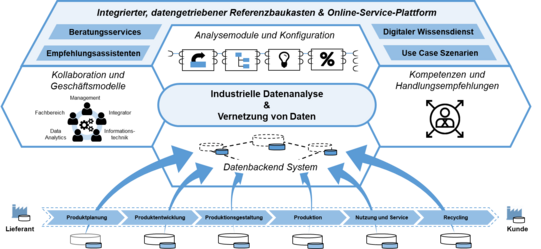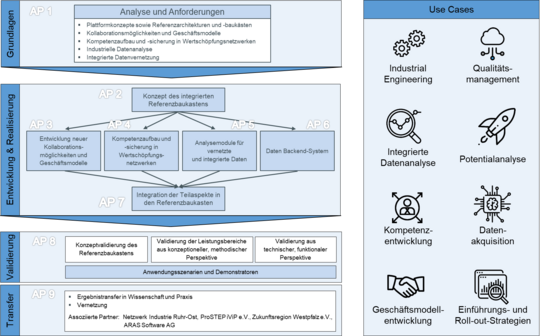
AKKORD
Networked and Integrated Application of Industrial Data Analysis for Value-Creating, Competence-Oriented Collaboration in Dynamic Value Networks
Problem
Industrial data analysis opens up innovative possibilities for manufacturing companies to sustainably optimise products and processes and enables the initiation of new business models and collaborations in value creation networks. However, current efforts are characterised by the growing realisation that SMEs in particular are unable to make meaningful and targeted use of modern analysis technologies on their own. There is a lack of both the necessary competences and introduction strategies in the companies themselves, as well as strategically oriented service and technology offers to be able to use the extensive potentials sustainably. The existing obstacles in the technical, but above all organisational integration of users, system providers and service providers make the realisation of lighthouse projects and the penetration of other industrial sectors with data analysis technologies difficult. There is a lack of an integrated concept to overcome the barriers and obstacles mentioned.
Objective
The aim of the project is to enable companies to profitably apply data analysis - both within the company and across value networks. For this purpose, an online service platform will be developed that includes solutions for comprehensive data integration as well as easy-to-use, standardised data analysis modules and dashboards and supports the initiation of new collaborations and business models. In addition, the development and provision of modules for competence analysis and acquisition will lay the foundation for targeted competence development of employees in the area of data analysis.

Procedure and Division of Labour
For the development of the reference toolkit and the online service platform, a structured project plan comprising nine work packages is being followed (see below). At the same time, eight use cases are being worked on, which ensures the validation of the work content already during the project.

Research, Development and Application Partners
The AKKORD research project is being developed by a team consisting of 14 consortium partners (research, development and application partners). RapidMiner GmbH is the consortium leader, while the Institute of Production Systems is responsible for project coordination.
Funding Reference
The project (funding code: 02P17D210) is funded by the Federal Ministry of Education and Research as part of the funding programme "Industry 4.0 - Collaborations in Dynamic Value Networks (InKoWe)" and is supervised by the Project Management Agency Karlsruhe.


![[Translate to English:] [Translate to English:]](/storages/zentraler_bilderpool/_processed_/2/6/csm_Altes_Maschinenbau-Gebaeude_3a1a87015a.jpg)